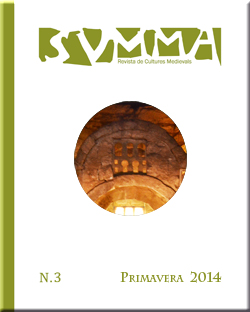Philosophical and Moral Problem Literature in the Portuguese Chansonnier Poetry
DOI:
https://doi.org/10.1344/Svmma2014.3.3Paraules clau:
problem literature, philosophical, moral, chansonnier, rhetorical games, Cancioneiro Geral, argumentationResum
Love is the privileged theme in 15th-century poetry chansonniers and problem literature is particularly adequate to discuss love matters. However, the analysis of Castilian poetical works allows us to acknowledge the existence of problem literature dealing with philosophical and ethical themes, albeit in lesser number. The situation is not different from the Cancioneiro Geral, by Garcia de Resende, where the genre is also characterized, in similar proportions, by the coexistence of love and philosophical themes. The aim of this article, which analyses this particular type of compositions in the Portuguese corpus, is to survey to what extent this poetical exchange allows a dynamic and original treatment of existential issues and a discussion about the lack of values. Consequently, the interaction between the questioner and the author of the answer allows us to broaden the scope of the question, revealing other possible interpretations for the suggested problem. Moreover, the philosophical and ethical problem literature also constitutes an exercise where poets test their expertise through rhetorical games that subvert the argument
of the opponent.
Descàrregues
Publicades
Número
Secció
Llicència
Els autors que publiquen en aquesta revista estan d'acord amb els termes següents:
a. Els autors conserven els drets d'autoria i atorguen a la revista el dret de primera publicació de l'obra. SVMMA Revista de Cultures Medievals publica amb una llicència de Reconeixement-NoComercial-CompartirIgual 3.0 Espanya de Creative Commons, la qual permet compartir l'obra amb tercers, sempre que aquests en reconeguin l'autoria, sense ànim de lucre i compartin l'obra derivada en les mateixes condicions.
b. Els autors són lliures de fer acords contractuals addicionals independents per a la distribució no exclusiva de la versió de l'obra publicada a la revista (com ara la publicació en un repositori institucional o en un llibre), sempre que se'n reconegui la publicació inicial en aquesta revista.
c. S'encoratja els autors a publicar la seva obra en línia (en repositoris institucionals o a la seva pàgina web, per exemple), amb l'objectiu d'aconseguir intercanvis productius i fer que l'obra obtingui més citacions (vegeu The Effect of Open Access, en anglès).





